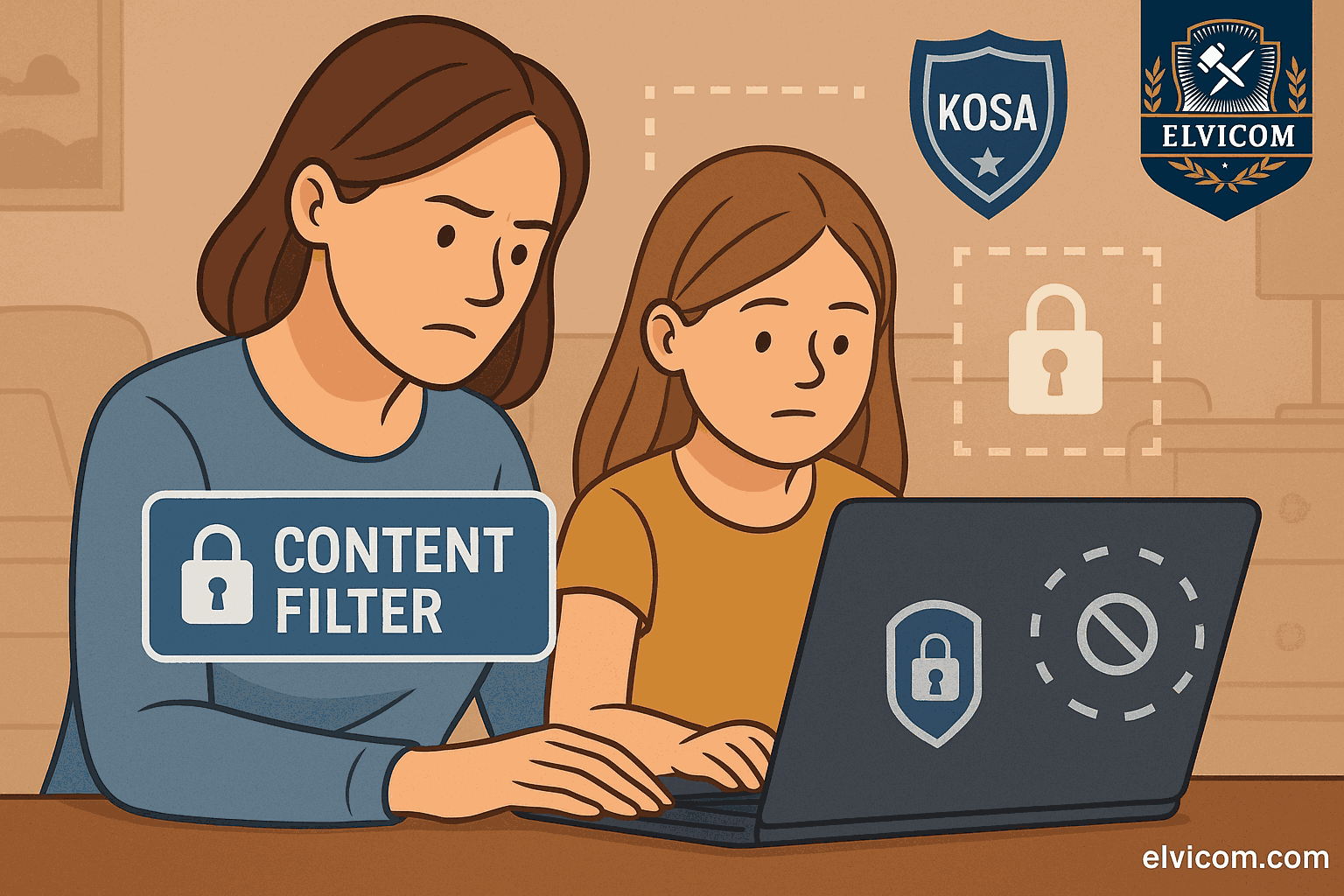In 2025, one law has sparked both hope and controversy across American households: the Kids Online Safety Act (KOSA). Designed to protect children from online harm, KOSA could drastically reshape the digital experience for kids—and even adults—across the United States.
But what exactly is KOSA, why is it being pushed now, and what should parents, educators, and tech-savvy teens be watching out for?
Let’s break it down in clear, parent-friendly terms.
What Is the Kids Online Safety Act (KOSA)?
KOSA is a federal bill aimed at protecting minors (defined as users under 17) from online content that could cause physical, emotional, or psychological harm.
Originally introduced in 2022 and gaining momentum in 2024–2025, KOSA would place strict responsibilities on tech platforms like TikTok, Instagram, YouTube, and even gaming networks to:
- Automatically enable the highest privacy settings for minors
- Restrict algorithmic content targeting to children
- Provide tools for parents to monitor and control activity
- Remove harmful content related to eating disorders, bullying, self-harm, and exploitation
In short, it flips the burden of safety onto platforms—not users or parents.
Why Now? The Rise of “Digital Harm”
Recent studies have shown sharp rises in anxiety, depression, body dysmorphia, and cyberbullying among American teens—especially girls. With high-profile whistleblower testimonies and mounting pressure from bipartisan lawmakers, the time was ripe for action.
Senator Marsha Blackburn (R-TN) and Senator Richard Blumenthal (D-CT), KOSA’s lead sponsors, argue that “children deserve a digital environment where they can learn and socialize without being tracked, profiled, or manipulated.”
What KOSA Requires from Big Tech
If passed into law, KOSA would force platforms to implement a wide range of changes. Here’s what tech companies would need to do:
1. Default to Privacy-First Settings
Children’s accounts would be locked into the most restrictive privacy configurations by default—disabling DMs, geotagging, and friend suggestions.
2. Turn Off Algorithmic Feeds for Minors
No more TikTok “For You” page or auto-play rabbit holes. KOSA bans personalized content feeds for children unless explicitly opted into with parental consent.
3. Provide Parental Access Dashboards
Parents would gain access to detailed dashboards showing content viewed, time spent, and even who their child has interacted with online.
4. Remove “Addictive” Features
Features designed to hook attention—like infinite scroll, autoplay, and gamified notifications—must be disabled for underage accounts.
5. Annual Audits & Enforcement
Companies must undergo third-party audits to prove compliance, or face fines and bans on minor usage.
Visual Chart: What Platforms Must Change Under KOSA
| Platform Feature | KOSA Requirement for Minors |
|---|---|
| Algorithmic Feed | Disabled by default |
| Direct Messages | Turned off unless approved |
| Ads & Data Tracking | Blocked for under-17 users |
| Parental Controls | Full dashboard and override |
| Notifications | Time-restricted and simplified |
What Critics Are Saying
Not everyone agrees KOSA is the right answer.
1. Free Speech Concerns
Civil liberties groups like the Electronic Frontier Foundation (EFF) warn that vague language in KOSA could lead to over-censorship. Content about LGBTQ+ issues, mental health, or protest movements might be unintentionally restricted.
2. Overreach by Parents or Government
Some teens worry about surveillance from overly strict parents. Others fear government agencies could exploit the rules to suppress dissent or monitor behavior.
3. Platform Liability Loopholes
Critics argue that large companies may comply with the “letter” of KOSA without addressing the spirit—simply applying blanket bans or ineffective tools to avoid legal trouble.
Real-World Impact: What Parents Should Expect
If KOSA becomes law, here’s how your child’s internet might change:
- Instagram won’t auto-suggest influencers or content feeds unless you manually allow it.
- YouTube’s autoplay will stop after one video if your child is logged in as underage.
- TikTok usage might be limited entirely depending on the app’s ability to comply.
- Gaming chats and friends lists could be restricted or monitored for harmful behavior.
- Schools and parental apps may gain new reporting access to online activity logs.
Is KOSA Good or Bad?
The truth is, it depends on how it’s enforced.
For parents concerned about screen addiction, bullying, and adult content, KOSA may be a welcome tool for digital safety. But for families raising independent teens—or communities already facing censorship—its implementation raises real concerns.
FAQs About KOSA and Your Child’s Internet
1. When will KOSA go into effect?
If passed by Congress in 2025, enforcement could begin as early as 2026, though major platforms are already testing safety features in preparation.
2. Will KOSA apply to my 17-year-old?
Yes. KOSA defines a “minor” as anyone under 17, though some provisions may differ for younger children.
3. Will kids be able to bypass restrictions with fake ages?
Possibly, but KOSA encourages platforms to implement stronger age verification tools. That could include biometrics, school email checks, or ID scanning.
4. Will I be notified if my child watches harmful content?
Yes, if parental controls are enabled. You’ll receive reports showing what types of content were viewed and for how long.
5. Can I opt out of KOSA restrictions as a parent?
In most cases, yes. But platforms may still be legally required to limit certain features unless both child and parent approve changes.
Final Thoughts
KOSA could transform the way U.S. children experience the internet—for better or worse. While it promises greater protection from digital harms, it also opens complex debates about free speech, digital independence, and parental control.
One thing is clear: the digital playground is about to get a major renovation.
If you’re a parent, teacher, or teen in 2025, now is the time to prepare, stay informed, and have open conversations about what safety and freedom should look like online.
Hashtags:
#KOSA #ChildOnlineSafety #DigitalParenting #Elvicom #InternetFreedom, #KOSA, #childsafety, #uslaws#Elvicom
Website:
https://elvicom.com
